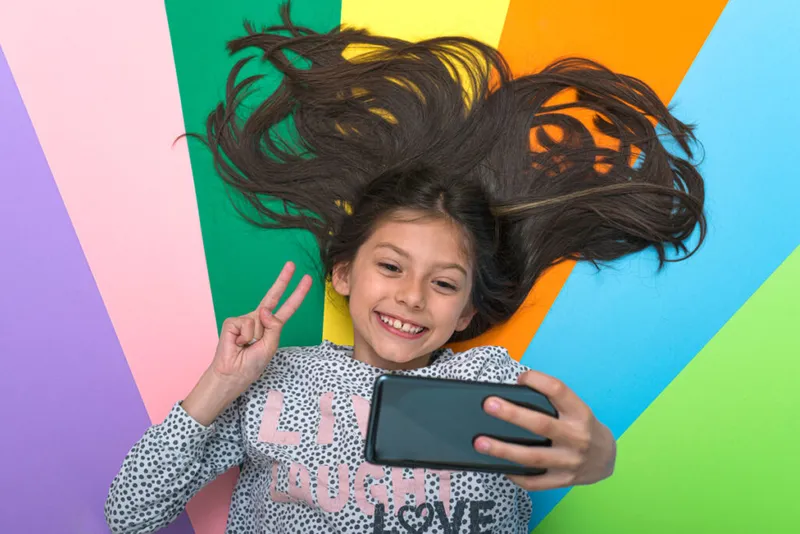Just about everywhere we look today, screens, and in particular social media, are being called addictive, and being blamed for causing mental health problems and damaging childhood development.
But does the evidence support this?
To find out, we spoke to Pete Etchells, professor of psychology and science communication at Bath Spa University and author of Unlocked: The Real Science of Screen Time. Pete tells us why we need to redefine our relationship with technology and why social media, for all its ills, may not be as bad as we often make out.
What is the problem with the concept of screen time?
Everybody knows what screen time is, which is why it's so compelling, right? But at the same time, nobody knows what screen time is because it's such a broad, vague definition. It can literally mean anything.
Screen time, fundamentally, is how much time you have spent on some sort of screen-based technology in a given time frame. So it might be in the past 24 hours or the past week or something like that. And it's really enticing because we can attach a really simple, straightforward number to it.
But I think we've become misguided. This isn't a meaningful thing to talk about or that we should pay attention to because when you start digging into it, screen time is just a meaningless concept.
undefined
What's the effect of screen time on us? Or you know, what's the effect of screen time on our mental health? What you end up doing is getting a number for your screen time and some sort of number that's a measure of your mental health.
But we can never get past that. We're only ever stuck at correlations.
If we start talking about what our own screen time actually is, it becomes really complicated, very quickly. And it just doesn't tell you anything meaningful at all.
So we've become stuck in a way, because screen time is just this big, nebulous term. It then becomes anything that we want it to be that we use to encapsulate a lot of worries that we have about our online lives. But it doesn't really have anything specific to it.
Okay, so screen time isn’t of much use. But are we using screens in an unhealthy, possibly addictive way?
We talk about things like ‘Ohh, I played that game or watched that show the other day and it was so addictive’. What we mean there is that we really liked it or that we played or used it a lot.
In some cases, we say it with a bit of a negative connotation and what we mean is that we've binge-watched a TV show and we didn’t feel so great afterwards – that’s how we use the word ‘addiction’ in day-to-day terms.
Obviously, addiction has a different meaning, a very strict clinical definition to describe things like drug addictions or gambling addictions.
The two often get conflated; we start to think of this sort of day-to-day language use in more formalised terms and vice-versa. So we get stuck in this frame of thinking.
Because of this, when we think about how we use social media or how we play games, it almost exclusively becomes in terms of excessive use or repetitive use. Questions like how much is too much? Is screen time good or bad for us?
This is a real problem that we've got in the wider conversations about screens and our relationship to them, but it's also a problem in the research literature as well.
This leaves a very limited set of solutions here that we know don't really work – things like abstinence or stopping use.
This framing just doesn't really encapsulate how we use screen-based technologies. Even if you take a specific aspect of it, like social media, it doesn't encapsulate the use of that either, because that's such a multifaceted thing as well.
So is there such a thing as healthy and unhealthy screen use? Yes, maybe. But I wonder whether we're asking the wrong sorts of questions, or rather, we're framing the questions in the wrong sort of way.
Read more:
- A social media ban for children would actually solve nothing. Here’s why
- Child depression rates are skyrocketing - but social media isn’t to blame. Here’s why
- Social networks are built to turn us against each other. Can we fix them?
What are some of the positive things about social media?
We are fundamentally social animals, right? And social media – the clues in the title – it's a social connecting experience.
This is a very big oversimplification of what social media is, but fundamentally at its core, it's about talking to people and connecting with people, and there’s huge power in that.
We often forget about those convenience factors that things like social media have for us.
It's almost a nonsensical term because it covers so many different things. But we've all got experiences of using social media over the pandemic to keep in touch with the people that we love and care about that we physically couldn't see.
WhatsApp and FaceTime are used to chat with people, to play games, for people to connect fundamentally. The connection is not always a positive thing and there are very deep, difficult, very emotive discussions and debates that we need to have about how we manage and curate those experiences.
But there are positives there, so we need to remind ourselves of those from time to time.
Are social media platforms doing a good or bad job at curating positive experiences for us?
It might seem like I'm coming across as an apologist for big tech. What I've been saying is that if you rethink and reframe the way you think about your relationship with technology, what it does is empower you a bit more.

One of the things about this addiction framework is that it disempowers people. If you're addicted to your smartphone because smartphones are addictive by design, then that's something that's happened to you. Therefore, it's very difficult for you individually to do something about it – that’s not the case at all.
We do have control and power over that situation. It’s effortful and it's difficult and it's not something that you just do once and then it's fixed. But we do have the power there and that's really important, somewhat paradoxically, for holding the tech industry to account.
There's this idea that social media gives you a dopamine hit and therefore it's addictive, which is completely nonsense on a number of levels and a complete misunderstanding of the neuroscience of dopamine.
It's understandable where those worries come from because experientially, we all feel as though we've had bad experiences with our devices and there’s a need to hold the industry to account.
But because we're framing things in these quite sensationalistic ways that aren't supported by research, it's really easy for tech companies to just ignore that and say: ‘That's all noise’.
We need to be better at understanding what the actual science says about screens – and being able to ask better questions that are much less easy for the tech industry to ignore.
What advice would you give to people who are worried about their tech use right now?
It’s a great question, and it’s obviously something that we all worry about.
We should try not to panic because things can always be fixed. It's trying not to get stuck in this way of thinking that the only way of being happy with your tech use is to kind of get rid of it all. That's not the only solution.
Think about your tech use in terms of habits rather than the sort of addictions and excessive use. It's very easy for us to develop habits, which, in and of themselves, are neutral. It's other things that happen or the situational and contextual factors, that then create good or bad habits.
One of the examples that I use in the book is phone-checking behaviours. Checking a phone is a neutral habit. It's neither harmful nor beneficial for us.
When you're driving down the road and just checking your phone to see what people are putting on Instagram, then that’s a really bad habit to get into for very obvious physical harm reasons.
But checking your phone at night when you feel a bit lonely and you want to connect with friends and just strike up a conversation with somebody, that's a really nice habit to get into and you'd see a positive impact on well-being in that sense.
There's an argument that for this kind of technology habit approach, what's going on is that it's not just sheer frequency in and of itself of screen use that's a problem.
The more you engage in a particular screen habit in a non-reflective, mindless way then the more you're opening yourself up to the risk of having a problematic episode.
Next time, think ‘can I catch myself a bit earlier in that process to stop that?’ If you can do that repeatedly, you'll find yourself weeding out those bad habits. It takes time and it takes effort and you'll get things wrong; that’s okay, we all make mistakes, but what we’re trying to do is improve the relationship we’ve got.
What do you think about the calls to ban smartphones for all under 16s?
It’s a really difficult, emotive and contentious topic. I worry about this being contextualised as a ban on smartphones. There are some people who are in difficult situations and it's really important that they have a mechanism by which they can stay in touch with people outside the school.
People in caring situations are a really good example of that and I think we very often forget those groups in these sorts of conversations. A blanket ban is bad because it further marginalises kids who are already having difficulties.

The other aspect of this is that what banning effectively does is to say that you can have this thing just at a later point. And that's absolutely fine providing that we build digital literacy skills before that point.
Just saying no phones and leaving it at that is a really dangerous situation to get into because eventually kids will get a phone and we don't want that to happen in a situation where they don't really know what they're doing with it and they don't know how to navigate that world.
If that happens at 16 or 18 or 25 or 5, it doesn't matter, you're still going to have a problem.
This interview is a shorter, edited version of the original. Listen to the full conversation on Instant Genius.
About our expert
Pete Etchells is a professor of psychology and science communications at Bath Spa University and author of Lost in a Good Game – Why We Play Games and What They Can Do For Us, and Unlocked – The Real Science of Screen Time (and How to Spend it better). His research interests lie in understanding the short- and long-term behavioural effects of playing video games and using other forms of digital technology. He has also been a science consultant for the BBC’s Horizon.
Listen to more episodes of Instant Genius: